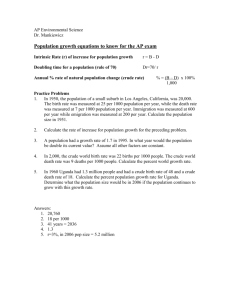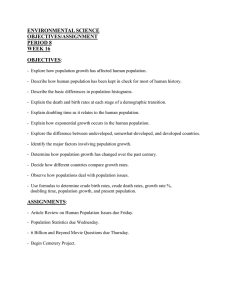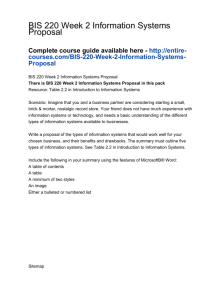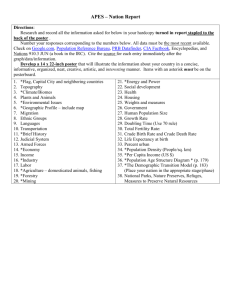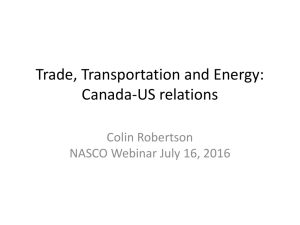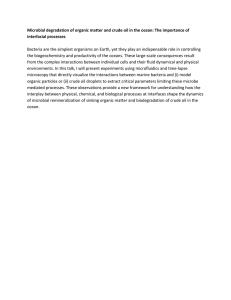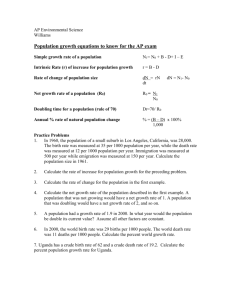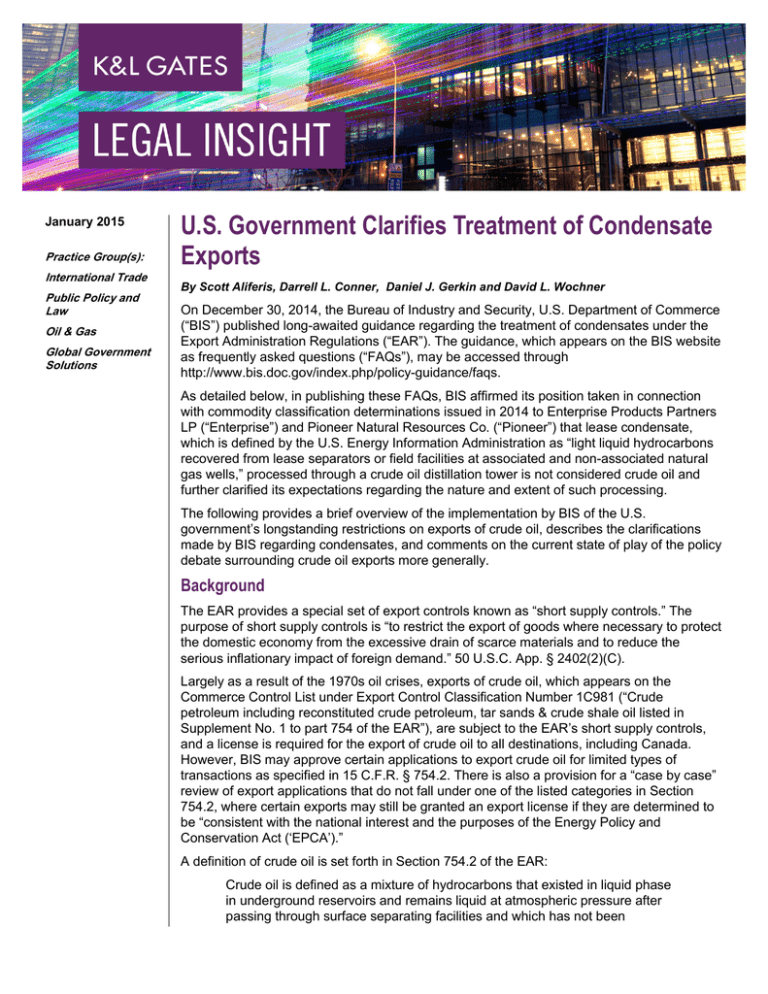
January 2015
Practice Group(s):
International Trade
Public Policy and
Law
Oil & Gas
Global Government
Solutions
U.S. Government Clarifies Treatment of Condensate
Exports
By Scott Aliferis, Darrell L. Conner, Daniel J. Gerkin and David L. Wochner
On December 30, 2014, the Bureau of Industry and Security, U.S. Department of Commerce
(“BIS”) published long-awaited guidance regarding the treatment of condensates under the
Export Administration Regulations (“EAR”). The guidance, which appears on the BIS website
as frequently asked questions (“FAQs”), may be accessed through
http://www.bis.doc.gov/index.php/policy-guidance/faqs.
As detailed below, in publishing these FAQs, BIS affirmed its position taken in connection
with commodity classification determinations issued in 2014 to Enterprise Products Partners
LP (“Enterprise”) and Pioneer Natural Resources Co. (“Pioneer”) that lease condensate,
which is defined by the U.S. Energy Information Administration as “light liquid hydrocarbons
recovered from lease separators or field facilities at associated and non-associated natural
gas wells,” processed through a crude oil distillation tower is not considered crude oil and
further clarified its expectations regarding the nature and extent of such processing.
The following provides a brief overview of the implementation by BIS of the U.S.
government’s longstanding restrictions on exports of crude oil, describes the clarifications
made by BIS regarding condensates, and comments on the current state of play of the policy
debate surrounding crude oil exports more generally.
Background
The EAR provides a special set of export controls known as “short supply controls.” The
purpose of short supply controls is “to restrict the export of goods where necessary to protect
the domestic economy from the excessive drain of scarce materials and to reduce the
serious inflationary impact of foreign demand.” 50 U.S.C. App. § 2402(2)(C).
Largely as a result of the 1970s oil crises, exports of crude oil, which appears on the
Commerce Control List under Export Control Classification Number 1C981 (“Crude
petroleum including reconstituted crude petroleum, tar sands & crude shale oil listed in
Supplement No. 1 to part 754 of the EAR”), are subject to the EAR’s short supply controls,
and a license is required for the export of crude oil to all destinations, including Canada.
However, BIS may approve certain applications to export crude oil for limited types of
transactions as specified in 15 C.F.R. § 754.2. There is also a provision for a “case by case”
review of export applications that do not fall under one of the listed categories in Section
754.2, where certain exports may still be granted an export license if they are determined to
be “consistent with the national interest and the purposes of the Energy Policy and
Conservation Act (‘EPCA’).”
A definition of crude oil is set forth in Section 754.2 of the EAR:
Crude oil is defined as a mixture of hydrocarbons that existed in liquid phase
in underground reservoirs and remains liquid at atmospheric pressure after
passing through surface separating facilities and which has not been
U.S. Government Clarifies Treatment of Condensate Exports
processed through a crude oil distillation tower. Included are reconstituted
crude petroleum, and lease condensate and liquid hydrocarbons produced
from tar sands, gilsonite, and oil shale. Drip gases are also included, but
topped crude oil, residual oil, and other finished and unfinished oils are
excluded.
As lease condensate is explicitly stated to be within the definition of crude oil, it likewise is
subject to the EAR’s short supply controls.
BIS Condensate Guidance
In 2014, BIS issued formal commodity classification determinations to Enterprise and
Pioneer, in which BIS classified certain condensates for export control purposes as EAR99
petroleum products (a third EAR99 determination, issued by BIS to Peaker Energy in
September 2013, also came to light). Items that are designated EAR99 may be shipped
without an export license under the designation “NRL” (no license required), unless an
embargoed destination, end-user, or end-use is involved. These determinations were widely
reported to have been based on the processing of the condensate through crude oil
distillation towers and triggered the filing of several commodity classification requests, as
well as export shipments of condensate based on self-classifications made in reliance upon
those prior determinations. BIS was reported to have issued questionnaires to the requesting
parties and to be preparing guidance for public dissemination that would shed additional light
on the treatment of condensate exports.
In its guidance, BIS confirmed that lease condensate, including lease condensate produced
from tar sands, gilsonite, and oil shale, no longer is considered crude oil after being passed
through a crude oil distillation tower; instead, such condensate is considered a petroleum
product classified as EAR99. BIS described distillation as “the process of separating a
mixture of components according to their differences in boiling points,” and further
commented that for “liquid hydrocarbons to be classified as petroleum products, there must
be material processing through a crude oil distillation tower.” BIS cautioned that if “there is no
processing in the distillation tower, or the processing is de minimis, the liquid hydrocarbons
will not qualify as petroleum products” and, thereafter, set forth six factors that it will consider
in reviewing commodity classifications, which BIS characterized as neither “categorical” nor
“exhaustive.” These factors reflect a fair degree of subjectivity, such that, while selfclassifications are perfectly permissible under the EAR, obtaining a formal commodity
classification determination from BIS in some circumstances may be the better approach.
BIS also made clear that processes utilizing “pressure reduction alone to separate vapors
from liquid or pressure changes at a uniform temperature, such as flash drums with heater
treaters or separators, do not constitute processing through a crude oil distillation tower.”
Crude Oil Export Policy
BIS previously has taken pains to characterize its treatment of condensates processed
through a crude oil distillation tower as merely an interpretation of existing regulations, as
opposed to a policy change. However, this interpretation may be a harbinger of things to
come as the policy debate surrounding the effective ban on crude oil exports heats up.
Indeed, on January 6, 2015, Rep. Mike McCaul (R-TX-10) introduced legislation in the
House of Representatives to repeal the crude oil export ban under the EPCA. The
legislation, which bears the short title “Crude Oil Export Act,” was co-sponsored by Reps.
2
U.S. Government Clarifies Treatment of Condensate Exports
Jeff Duncan (R-SC-3), Ted Poe (R-TX-2), Jim Bridenstine (R-OK-1), and Michael Conaway
(R-TX-11) and has been referred to the House Committee on Foreign Affairs, as well as to
the Committees on Natural Resources, Energy and Commerce, and Rules.
The Crude Oil Export Act proposes the repeal of the relevant section of the EPCA, as well as
certain conforming amendments, including the repeal of the relevant sections of all but one
of the corollary statutes pertaining to crude oil exports (the proposed legislation does not
explicitly reference the Naval Petroleum Reserves Production Act). Furthermore, the
proposed legislation would render Section 754.2 of the EAR null and void.
In place of the current version of Section 754.2 of the EAR, the Crude Oil Export Act
proposes a BIS licensing regime whereby BIS would grant licenses for the exportation of
crude oil, unless: (i) the country of destination is subject to U.S. trade sanctions or
restrictions; or (ii) the president or Congress have designated the destination country as
subject to exclusion on national security grounds. Furthermore, the Crude Oil Export Act
would authorize the president to enact successive 90-day bans on crude oil exports during
periods of national emergency (the imposition or renewal of such a ban would be subject to a
Congressional resolution of disapproval).
This proposed legislation ultimately may amount only to an initial salvo as there may not be
sufficient support in Congress to repeal the ban, particularly given the limbo state in which
the Keystone XL pipeline project is mired. Indeed, House Energy and Commerce Committee
Chairman Fred Upton (R-MI-6) is taking a go-slow approach towards any effort to lift the ban.
His position is particularly relevant since the committee has primary jurisdiction over EPCA
and any proposals to alter it. Many other House members are taking a cautious approach,
partly out of concern that lifting the ban could lead to higher gas prices for American
consumers.
Nevertheless, the initiative has some powerful allies, including new Senate Energy and
Natural Resources Committee Chairwoman Lisa Murkowski (R-AK).
Sen. Ted Cruz (R-TX) filed an amendment to a Keystone authorization bill that would repeal
the ban. It would also repeal the ban on exports of oil that cross a right-of-way over federal
land or oil from the outer continental shelf. It appears unlikely that there will be a vote on the
amendment. Nonetheless, the amendment demonstrates Sen. Cruz’s level of interest on the
issue. He may look for other opportunities throughout the year to push for Senate debate and
a vote.
On the other side of the debate, Sens. Ed Markey (D-MA) and Robert Menendez (D-NJ) are
consistent critics of the new initiatives and actions by BIS. On July 2, 2014, the Senators
wrote a letter to Secretary of Commerce Penny Pritzker stating that “exports of condensate
or other light crude oils appear to be prohibited.” The letter posed a number of questions to
regulators. On January 16, 2015, both senators wrote a new letter arguing against the new
BIS guidance and advocating that the U.S. Department of Commerce should “vigorously
preserve the oil export ban and ensure American oil prices are as low as possible.”
House and Senate hearings are likely throughout this year on energy policy and BIS
activities. New studies and reports by government agencies and private sector organizations
can also be expected.
For additional information regarding these developments or the Energy, International Trade,
and Public Policy and Law practices at K&L Gates, please contact the authors.
3
U.S. Government Clarifies Treatment of Condensate Exports
Authors:
Scott Aliferis
scott.aliferis@klgates.com
+1.202.661.3865
Darrell L. Conner
darrell.conner@klgates.com
+1.202.661.6220
Daniel J. Gerkin
daniel.gerkin@klgates.com
+1.202.778.9168
David L. Wochner
david.wochner@klgates.com
+1.202.778.9014
Anchorage Austin Beijing Berlin Boston Brisbane Brussels Charleston Charlotte Chicago Dallas Doha Dubai Fort Worth Frankfurt
Harrisburg Hong Kong Houston London Los Angeles Melbourne Miami Milan Moscow Newark New York Orange County Palo Alto Paris
Perth Pittsburgh Portland Raleigh Research Triangle Park San Francisco São Paulo Seattle Seoul Shanghai Singapore Spokane
Sydney Taipei Tokyo Warsaw Washington, D.C. Wilmington
K&L Gates comprises more than 2,000 lawyers globally who practice in fully integrated offices located on five
continents. The firm represents leading multinational corporations, growth and middle-market companies, capital
markets participants and entrepreneurs in every major industry group as well as public sector entities, educational
institutions, philanthropic organizations and individuals. For more information about K&L Gates or its locations,
practices and registrations, visit www.klgates.com.
This publication is for informational purposes and does not contain or convey legal advice. The information herein should not be used or relied upon in
regard to any particular facts or circumstances without first consulting a lawyer.
© 2015 K&L Gates LLP. All Rights Reserved.
4

